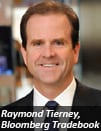The fiduciary duty of pension funds and their intermediaries to spend responsibly every penny handed over by individual investors can be hard to fulfil in complex financial markets.
But a commission recapture solution developed by agency broker Bloomberg Tradebook and technology vendor UAT aims to enhance trader productivity – and investment performance – by automating a process that has long been hindered by inefficiency.
Under the Securities and Exchange Commission’s Investment Company Act, asset owners – which can include buy-side firms that have funds handled by unaffiliated asset managers, as well as trusts and pension schemes – are the legal holders of the commissions generated from their assets.
This means trustees must have oversight of the trading function and have the legal right to recapture a portion of the commissions generated from the dealing of a fund’s assets and deliver this back to end-investors.
But management of this process has historically been manual and the amount of commission that can be recaptured is generally determined after trades have been completed and paid via a rebate.
UAT and Bloomberg’s Boomerang algorithm – which has been in the works for over five years – allow users to define high- and low-touch trades and route the low-touch orders directly to Bloomberg Tradebook for execution. Orders designated as high-touch remain on the buy-side trader’s blotter.
Boomerang automates and manages the rebates, reconciliation and broker lists associated with commission recapture using customised, user-defined rules that can be controlled by the trader in real time.
Focusing on value
“Our partnership with Bloomberg Tradebook means there is no need for the manual reconciliation associated with commission recapture, which can be time-consuming and expensive to track,” said UAT CEO Tom Warren. “By using Boomerang to automatically direct low-touch trades directly to Bloomberg Tradebook, traders can spend more time on delivering value for those trades that are more crucial to fund performance.”
According to Warren, fund performance can be improved by between 4-6 basis points on an annual basis through more efficient commission recapture.
Given the current equity trading environment, characterised by budget cuts on buy-side trading desks, low equity trading volumes and high volatility, retention and addition of alpha is becoming ever more challenging for asset managers. In short, in today’s world, every basis point counts.
Warren points to the universe of US large cap funds, where the performance differential between the first and fifth quintiles is 16.3 basis points and highlights that 83% of these funds trailed the S&P 500 over the last year.
Moreover, with consultancy TABB Group estimating that buy-side commission wallets are expected to plunge by a third by the end of the year, the buy-side is becoming ever more watchful in how they spend commissions to consume brokerage resources.
 “Asset managers have to produce more with less these days,” said Ray Tierney, president and CEO of Bloomberg Tradebook. “The Boomerang offering comes at a time when no one in the industry can afford to leave money on the table. Traders need to devote attention to high-value trades that drive performance, while considering ways to reduce costs in order to maximise shareholder value.”
“Asset managers have to produce more with less these days,” said Ray Tierney, president and CEO of Bloomberg Tradebook. “The Boomerang offering comes at a time when no one in the industry can afford to leave money on the table. Traders need to devote attention to high-value trades that drive performance, while considering ways to reduce costs in order to maximise shareholder value.”
Boomerang gives the traders control of accounts can be fully integrated with the asset owner via their order management system or accessible via the Bloomberg Professional terminal. Traders can determine the algo’s parameters based on expected market impact.
Asset owners that use multiple investment management firms are required to enter into commission recapture agreements with their asset management counterparts, which in turn sign an executing broker agreement with Bloomberg Tradebook.
